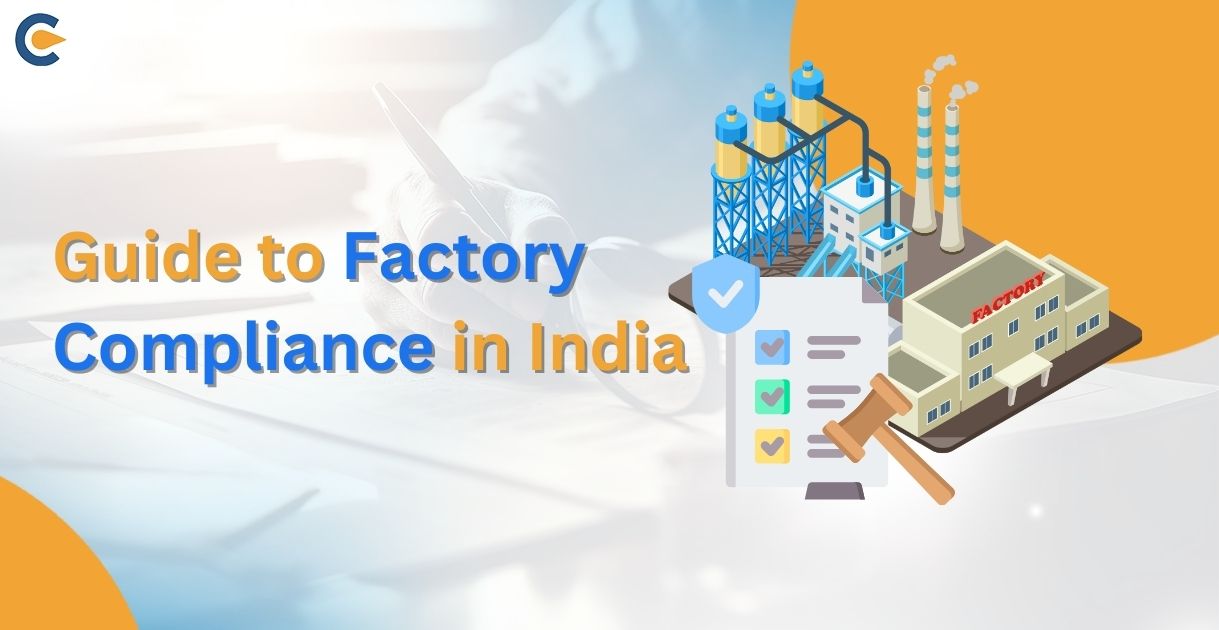During colonial times, the Indian Labour and Workmen faced numerous atrocities and human rights violations. There was no wage parity, definite work schedule, job security, or workplace amenities, which led to frequent strikes and protests by the workers, leading to the disruption of production work. Factory Compliances were not a concern of Factory Owners and industrialists, and hence, there was a lot of mismanagement in the sector. Post-independence, one of the most crucial challenges in workplace safety and wage security was the welfare of factory workers. Aspects such as payroll, provident fund, minimum wage, working conditions, maternity benefits, gratuity, etc., were vastly overlooked by factory owners, and the workers were pressing for more stringent rules and regulations to look after their interests. Hence, the First Factories Act was enacted in 1881 and later amended in 1891 and 1932. The Government of India continued with the outdated Colonial Factories Act until the amendment to the current act was passed in 1948. The main objective of this act is to provide workplace safety, security, good work conditions, and reasonable working hours. The present Factories Act applies to all factories using power and employing ten or more workers, and the work is carried out without the use of power or factories with more than 20 where work is carried out in factories using power. The Act provides social security to workers in a state falling under the category of both seasonal and non-seasonal factories. The Act ensures that the workers adequately benefit from several other labour and employment-related benefits as well, such as the Minimum Wages Act, payment of Bonus Act, payment of Gratuity Act, Maternity Benefit Act, etc. The act also prohibits several industrial malpractices, such as labour, bonded labour, unequal pay, and absence of workplace safety.
The role of the Chief Inspector of Factories, as the authorized representative of the Government of India,is to ensure that the entire factory compliance framework adheres to the statutory requirements of the Factories Act. Suppose you are looking forward to setting up a factory or establishment in India. This article will help you navigate the important statutory compliances and requirements that are necessary to establish a factory in India.
Factory Compliance Checklist for Setting up a Manufacturing Unit in India
For setting – up a Factory or Manufacturing Unit in India, several statutory compliance and licensing requirements are to be abided by. There are several regulatory approvals and compliances required to meet all statutory requirements of setting up a factory or a manufacturing unit. They are –
Factory Layout Approval
Location is the most important factor in factory compliance that requires careful looking to ensure your factory or manufacturing unit enjoys the advantages of strategic location and easy mobility of raw materials and labour. Once you decide on the location of your unit, you are required to have your layout plan approved by the Director of Factories, Joint Chief Inspector of Factories, and Deputy Chief Inspector of the concerned state Labour Department of the state and State Labour Welfare Board. Once the site plan is approved, you can proceed with applying for the Factory Registration License.
Licenses and Registration for Factory set-up
As a major Factory Compliance, you are required to obtain regulatory licenses and clearances such as filings with the Registrar of Companies, Municipal Licenses, Local Registry of Factories, Environmental Clearances and licenses, Consent to Operate, and Consent to Establish from the Pollution Control Board along with any other specific license or clearance required for the type of manufacturing unit or factory you are setting up. Adhering to Statutory compliance is important, as non-compliance with this act and the underlying provisions can lead to serious penalties.
Legal Compliances related to payroll, HR, and employment conditions of workers
To comply with statutory compliances in HR, several acts and regulations were formed to govern the conditions and interests of workmen, such as the Maternity Benefit Act, Employees’ Provident Fund Act, Employees’ State Insurance Act, Income Tax, GST Provisions, etc. The Factory compliance requirements in the domain of legal rights, benefits of the workers, and workplace safety are divided into several categories with specialized laws and guidelines covering the provisions of the Factories Act. These statutes prescribe factory compliances that cover all major areas of industrial compliances as a whole – health and safety, maternity, minimum wage, licensing, etc. Non-compliance with these major factory compliances can lead to some serious consequences, such as penalties, heavy fines, prosecution, and even imprisonment for the factory owner or manager.
Factory Compliance Audit
To ensure the legal and financial wellbeing of your factory or manufacturing unit, a periodic factory compliance audit, which includes a health and safety audit of the workers, by an experienced industrial auditor or charted accountant is necessary. A statutory audit helps in identifying major non-complacency areas, helps assess the internal financial health of the company, tunes internal functioning and controls, helps evade penalties or fines on account of violations and non-compliances, and lays out a plan for the Factory or manufacturing unit.
Payroll and Labour Laws Applicable to Factories
Factories Act, 1948
The Factories Act is the governing legislation for employees’ working conditions in Factories and Manufacturing Units in India. The act lays down factory compliances that are necessary to be observed by the owners and maintainers of factories and manufacturing units. It contains provisions for the standard of equipment, machines, and their quality, which is necessary to ensure workplace safety, layout, and infrastructure specifications of the factory or manufacturing units. The Act mandates the owner or manager of the factory to provide PPE gear, such as gloves, helmets, protective vests, earplugs, respirators, etc, to the employees if they work in hazardous work environments. This PPE requirement in Indian Factories ensures that there is less risk of hazard and injury among workers. The act also specifies the licensing and compliance requirements for factories and manufacturing units and the procedure for their license approval and renewal.
Maternity Benefit Act, 1961
Maternity Benefit Act protects the rights of employed women during pregnancy in India. The statute provides pregnant women with a 26-week maternity leave, with an additional eight weeks, and applies to companies with ten or more employees or at least one female employee, such as factories and manufacturing units, mines, processing plants, etc. According to this act, employers are required to support the women employed in their establishment financially during this time in an amount equal to their average daily wage. The act also stipulates a notice time before taking maternity leave and forbids hiring pregnant women for six weeks after delivery. Women who experience a miscarriage or medically assisted pregnancy termination are entitled to six weeks of paid leave as per the maternity benefits covered under this act.
Minimum Wages Act, 1948
The Minimum Wages Act applies to a commercial establishment employing 1000 or more workers. It is a statutory compliance in India, meant to provide workers with a minimum level of wages to workers in the organized sector. The Act also empowers the government to fix minimum wages and revise wages for five years. This Factory Compliance ensures that every worker, irrespective of age, gender, and qualification, is paid in adequate proportion to his/her skill and daily hours devoted to the work.
Contract Labour (Regulation and Abolition) Act, 1970
Contract Labour Regulation Act governs the working conditions of contractual workers in a factory or manufacturing unit. The Act not only defines what contract labour is but also strives to protect the interests of and provide welfare to the Contractual workers working in factories and other hazardous environments. The Act protects contractual workers from unjust termination, education or non-payment of wages by the employer, exploitation, and other malpractices.
Employee’s Compensation Act, 1923
Factories or Manufacturing units are inherently hazardous environments, posing constant threats to the life and safety of the labourers working in factories. Factors such as machines, noxious fumes, heavy water, exposure to chemical pollutants, etc., pose a threat to the safety and life of the workers, making Occupational Health and Safety (OSH) the most important factory compliance. The provisions of the Employee’s Compensation Act guarantee, indemnify and protect the workers against any untoward incident or harm they might sustain in the course of their employment while working in the factory or manufacturing unit. The Act provides compensation for injury sustained by the employee, fully or partially, in proportion to his last drawn salary and based on the degree of his bodily injury or impairment. The provisions of the Act apply only to the injuries arising in the direct course of work and not remote or indirect.
Employees’ Provident Fund Act, 1952
The provisions of the Provident Fund Act provides for provisions provide retirement and post-employment benefits to workers. The Provident Fund is constituted by matching contributions of both the employees and as well as the employer. The money accumulated in the provident Fund can be withdrawn by the employee for education, healthcare, or other personal finances. A Provident Fund is a very important labour and employment prerequisite for any organization.
Employees’ State Insurance Corporation Act, 1948, or Employees State Insurance Act
The ESI Act of 1948 applies to all factories or manufacturing units employing 20 more employees and applies to only those workers whose monthly wages do not exceed Rs. 15,000 and Rs. 25,000 in case of a worker with a disability. This factory compliance under The ESIC Scheme provides medical and health benefits to the workers at designated hospitals and ESIC centres. The Scheme also financially benefits the workers during times of incapacity to work due to illness, poor health, or disablement. The State Government partially bears the cost of the medical benefits covered under the act, whereas the rest is borne by the employer and the employee working in the factory or manufacturing unit.
Equal Remuneration Act, 1976
The Equal Remuneration Act of 1976 provides for equal wages for both male and female workers and prohibits discrimination based on gender, caste, creed, etc. The Equal Remuneration Act also ensures workplace security and job assurance to employees so that no worker is unjustly dismissed or retrenched from work. It was the first act to provide equality of opportunity for men and women and ensure no discrimination based on gender alone.
Environmental Compliances for Indian Factories
The process of waste management in Indian Factories requires compliance with environmental laws, such as the Environment Protection Act, Air Act, Water Act, etc. Waste management in India is crucial, especially for heavy-waste discharging industries and factories. To set up a factory or a manufacturing unit, you are required to obtain Consent to operate and Consent to establish a license from the concerned Central and State Pollution Control Boards. Getting an environmental clearance is a necessary prerequisite for complying with ESG and CSR commitments of factories and industrial units, as prescribed under various laws and guidelines.
Structural Compliances for Factories in India
Compliances such as Fire Safety Compliance are the most important for the purpose of declaring the structural soundness of a factory premises. You are required to obtain a Fire NOC from the state fire department, complying with all major requirements to be certified as a fire-safety-compliant factory premise. Additionally, the ISO Certificate given by the Chief Inspector of Factories declares the structural soundness of your factory premises, machines, installations, lifts and hoists, in-built structures, foundational strength, etc.
Conclusion
The Labour and Employment laws in India have lately gained strict recognition and entail deep consequences if they are tampered with. If you are about to set up a factory or manufacturing unit in India, there is a long list of statutory compliances and regulatory approvals required from the authorities, and it establishes the importance of statutory compliance in the secondary sector in India. Setting – up a factory or manufacturing unit can be a very challenging task and demands professional help and expert documentation to ensure compliance at all levels. The labourers working in factories enjoy sufficient protection of labour laws. Hence, statutory compliances are necessary to ensure adequate compliance with laws.
Frequently Asked Questions?
The various labour welfare initiatives, laws and regulations applicable to the factories and manufacturing units in India are –
1. Factories Act, 1948
2. Maternity Benefit Act, 1961
3. Minimum Wages Act, 1948
4. The Workmen Compensation Act 1923
5. Employees State Insurance Corporation Act, 1948 (ESI)
6. Employees Provident Fund Act, 1950
7. Payment of Wages Act, 1936
The Factories Act applies to all establishments, including factories using power and employing ten or more employees, factories that employ 20 or more employees, and factories where manufacturing is carried out without the use of power.
The first item on the checklist is whether the factory license was validly issued by the appropriate authorities. It encompasses elements like work schedules, labour welfare, resources for employee wellbeing, and workplace safety and health protocols. The audit assesses compliance with legislation about child labour, leave regulations, and female employees’ compliance with the Maternity Benefit Act. Laws about minimum wage, regular salary payments, and correct employment record-keeping are essential components. The checklist also includes compliance with environmental regulations, especially for firms that handle pollutants, and cooperation with government inspections and industrial relations procedures. Social security benefits, such as employee insurance and provident fund payments, must comply with regulatory standards and labourand employment laws. The EPF and ESI compliances, provident fund contributions, contract labour laws, and careful record-keeping are all important components of factory compliance in India.
The Factories Act was first introduced in 1881 and was amended thrice – in 1881, 1891, and 1911. The Current Factories Act was enacted in 1948. The present Factories Act has also been amended in 2016.
Bonus is calculated as per the Payment of Bonus Act,1965. Payment of Bonus Act provides an annual bonus minimum at the rate of 8.33% of the salary during the year, or one hundred rupees will be given in case of employees above 15 years and sixty rupees in case of employees below 15 years, whichever is higher. The maximum bonus is 20% of salary.
Since dealing with statutory compliance requires meticulous due diligence and regulatory compliance procedures, Corpbiz provides compliance management services and ensures statutory compliance on behalf of your factory or manufacturing unit. Corpbiz is the best compliance management firm for setting up a factory business in India.
Anyone found violating the statutory provisions of the Factories Act shall be liable for up to 2 lakh rupees or imprisonment for up to 2 years.
To ensure Factory Compliance, you can take the help of compliance experts who would guide you in obtaining necessary approvals, making regulatory filings, conducting financial and legal due diligence, and maintaining proper compliance records for your factory or manufacturing unit.
At Corpbiz, we provide complete compliance solutions and regulatory requisites that are required forthe purpose of setting up your factory or manufacturing unit in India cost-effectively.
As per the Act, the maximum number of working hours per week is 48, whereas the daily working hours should not exceed 12. At least one day should be designated as a non-working day.
The Chief Inspector of the state Labour Commission or Director of Factories in some states is empowered to inspect, examine, verify, and grant license of registration and incorporation of a factory or manufacturing unit.
Child Labour Laws in India are very particular and well-defined. As per the Child Labour (Regulation and Abolition) Act of 1986,it is a punishable offence to employ children below the age of 14 years in any category in a hazardous environment, factories, or manufacturing units.
An Occupier is defined under section 2(n) as someone who has possession of the premises of the factory and has ultimate control over the affairs and processes being carried out in the establishment.
The act provides for sitting places, canteens, changing areas, spittoons, and other workplace amenities for workers working in a factory.
Factory Compliances help keep your business in legal shape and prevent penalties and fines in respect of any major non-compliance in the future. If you are looking to set up your factory or manufacturing business in India, Corpbiz is your one-stop solution, providing quality compliance services that are reliable and affordable. Visit us today to know more!
Read Our Article: Impact of Regulatory Compliance in Indian Business













